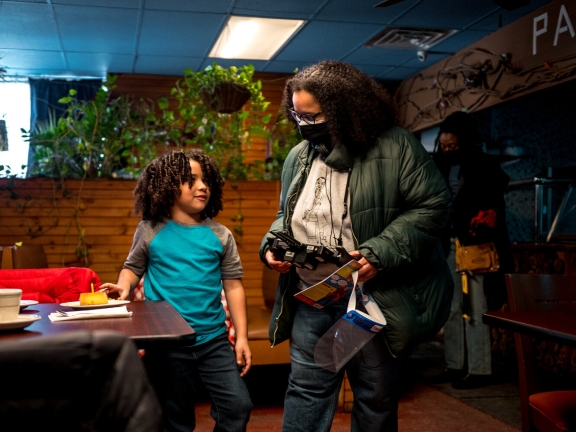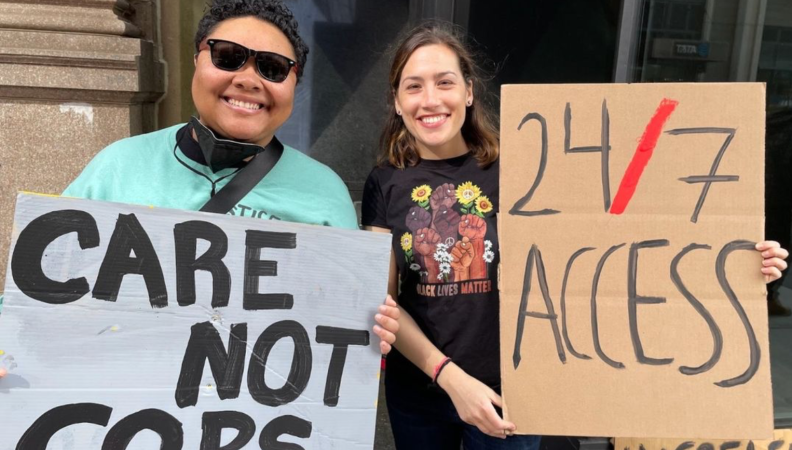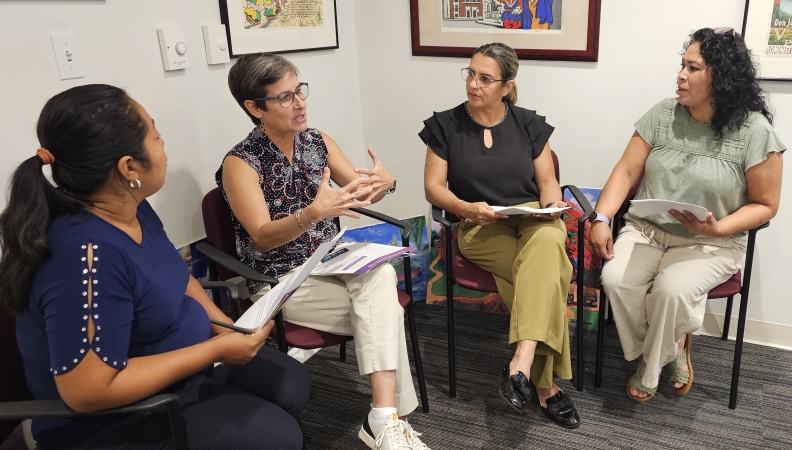Award-Winning Filmmaker Eunice Levis Shares Her Unconventional Path to Film

Eunice Levis is an award-winning filmmaker, teacher, trained journalist, and co-host of the podcast “Café Negro con Genre.” She is passionate about building Philly’s indie-film ecosystem and nurturing the next generation of filmmakers. Her work explores unseen or ignored narratives, as in her acclaimed futuristic film, “InVade,” which delves into the story of an undocumented Afro-Latine father navigating a climate disaster. For “Ro & the Stardust,” Eunice won Best Narrative Short at the Reel Sisters of the Diaspora Film Festival and an Oscar-qualifying category. She is also a Netflix/NALIP Women of Color Short Film Incubator fellow.
Eunice was one of the first recipients of the IPMF Local Filmmaker Fund grant in 2020 and received another grant in 2024, awarded by a community-led grantmaking panel of local filmmakers and film advocates.
We talked with Eunice about her journey as a filmmaker and her vision and inspiration.
IPMF: Your journey has not been a traditional one. Can you describe the path and the challenges you faced while becoming an indie filmmaker?
Eunice Levis: It wasn’t my initial goal to be a filmmaker. I am a first generation American and I grew up in the Bronx, so I did not have many filmmaker role models. I did, however, know of a Latine newspaper publisher, Rossana Rosado. At the time, she was the executive director and publisher of the largest Spanish language daily newspaper in New York, El Diario/ La Prensa. I took a paid internship at the paper and was later hired as her executive assistant. That’s where I began my career as a journalist. Once, on an assignment covering the Puerto Rican Day Parade, I had the opportunity to take photos and footage. I fell deeply in love with the visual medium. I fell in love with being able to tell the story through camera as well as words. That was the point where I just decided that I was going to do both. After that I went to graduate school at NYU. I was unable to commit to a full-time film program, so I did it part time. It was a fantastic experience and it shaped my voice and vision.

How would you describe your artistic voice?
Eunice: Exploring unseen or ignored narratives is quite honestly a passion of mine. In my stories, a grandmother is a mechanic, a young mother saves the world, a neurodivergent child is a popular kid. The struggles and adventures in life are not limited by gender, age, background. The human experience is wildly similar. We are more alike than we think. So, my stories will always explore universal themes through an uncommon lens.
I love to empower characters that one would normally not imagine as leads. In “InVADE,” the protagonist is an undocumented scientist. People like us who are immigrants know that someone may be an accomplished scientist or neurologist in their home country but they immigrate here and are forced to take any job available. In “Ro & the Stardust,” my lead was an 80-year-old woman scientist. She wanted to build a rocket to go to the moon. In that story, I was able to kind of play around with who gets to build with their hands and gets to show their engineering skills, and who gets to leave the planet. I really love to dig into the human experience and show people fantastical and unexpected situations. I just love the idea of being able to send an older woman on a rocketship to wherever she wants to go.
As a teacher, how are you mentoring the next generation of filmmakers?
Eunice: I am an adjunct professor at Saint Joseph’s University in Philadelphia. I teach an introductory class to digital filmmaking, and as part of the curriculum, students are tasked with completing three short film projects. Each project progressively builds skills and creative inclination. I think part of “building” a filmmaker is providing students with a solid toolbox and hands-on experience. I like to start with the basics: the origin of film, the types of filmmaking, and later, finding the artist's voice.

What do you think is the role of Independent BIPOC-filmmakers within the Philly ecosystem? How important do you think their role is and why?
Eunice: I think Philly’s indie creatives should aim to highlight communities and voices that are overlooked and/or abandoned. They should crew, cast, and film within the Philadelphia region, ensuring that any funds will be reinvested into the community. And lastly, if possible, they should allow someone interested in the art form to shadow their work. We need to develop homegrown artists that understand how to use the visual platform. Pathways into filmmaking are limited, allowing someone to come on set or sit in on a production meeting can be just as impactful as sitting in a classroom.
What are some of the ways you are inspiring other BIPOC emerging filmmakers? How are you building a community?
Eunice: Aside from teaching, I also co-host a podcast, “Café Negro con Genre.” The podcast often collaborates with the Philadelphia Latino Film Festival, targeting the festival’s audience and alumni. The goal of our podcast is to highlight and connect BIPOC creatives working within the genre space, thus building a stronger creative community.
Tell us about what it was like to receive the IPMF grant? What pathways have opened for you since then?
Eunice: It was such a great honor to be nominated. It happened right around Covid, and at a time when I really needed support. The grant gave me the ability to see the project through while helping me to be Covid compliant during our production days. We had to test every morning, and so a lot of the funds from the grant were used to comply with that and to ensure that everybody was safe on set. I was able to hire 67 local creatives during a time when no one was working and production was stalled. So, you know part of the grant was really reinvesting in the community.
It has been a wonderful ride since. We were able to complete the project and “InVade” has gotten distribution and we are really excited about that. I am hoping that all this will open up conversation for us to create a series here in Philadelphia. I was able to use my experience in producing, writing and directing “InVade” to move on to become the Netflix/NALIP Women of Color Short Film Incubator fellow. That was amazing and I was able to create “Ro & the Stardust” which had a tremendous Festival run, and we were actually Oscar qualified for 2024. I owe that experience really to the seed money that I had received from IPMF.
This interview was edited for context and clarity.
Photo credits: Eunice Levis



